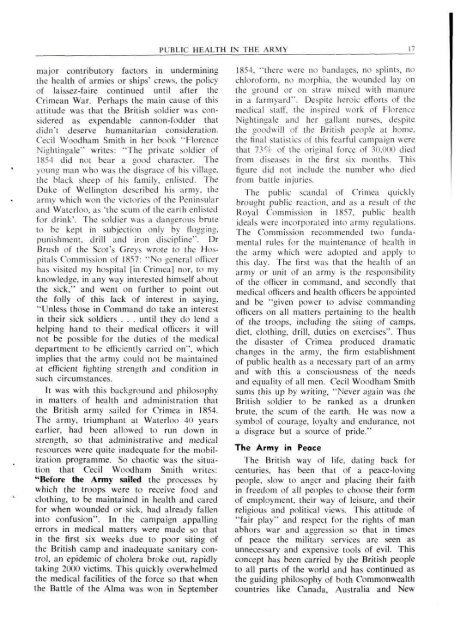ISSUE 3 : Mar/Apr - 1977 - Australian Defence Force Journal
ISSUE 3 : Mar/Apr - 1977 - Australian Defence Force Journal
ISSUE 3 : Mar/Apr - 1977 - Australian Defence Force Journal
Create successful ePaper yourself
Turn your PDF publications into a flip-book with our unique Google optimized e-Paper software.
PUBLIC HEALTH IN THE ARMYrmajor contributory factors in underminingthe health of armies or ships' crews, the policyof laissez-faire continued until after theCrimean War. Perhaps the main cause of thisattitude was that the British soldier was consideredas expendable cannon-fodder thatdidn't deserve humanitarian consideration.Cecil Woodham Smith in her book "FlorenceNightingale" writes: "The private soldier of1854 did not bear a good character. Theyoung man who was the disgrace of his village,the black sheep of his family, enlisted. TheDuke of Wellington described his army, thearmy which won the victories of the Peninsularand Waterloo, as 'the scum of the earth enlistedfor drink'. The soldier was a dangerous bruteto be kept in subjection only by flogging,punishment, drill and iron discipline". DrBrush of the Scot's Greys wrote to the HospitalsCommission of 1857: "No general officerhas visited my hospital Lin Crimea] nor, to myknowledge, in any way interested himself aboutthe sick," and went on further to point outthe folly of this lack of interest in saying,"Unless those in Command do take an interestin their sick soldiers . . . until they do lend ahelping hand to their medical officers it willnot be possible for the duties of the medicaldepartment to be efficiently carried on", whichimplies that the army could not be maintainedat efficient fighting strength and condition insuch circumstances.It was with this background and philosophyin matters of health and administration thatthe British army sailed for Crimea in 1854.The army, triumphant at Waterloo 40 yearsearlier, had been allowed to run down instrength, so that administrative and medicalresources were quite inadequate for the mobilizationprogramme. So chaotic was the situationthat Cecil Woodham Smith writes:"Before the Army sailed the processes bywhich the troops were to receive food andclothing, to be maintained in health and caredfor when wounded or sick, had already falleninto confusion". In the campaign appallingerrors in medical matters were made so thatin the first six weeks due to poor siting ofthe British camp and inadequate sanitary control,an epidemic of cholera broke out, rapidlytaking 2000 victims. This quickly overwhelmedthe medical facilities of the force so that whenthe Battle of the Alma was won in September1854, "there were no bandages, no splints, nochloroform, no morphia, the wounded lay onthe ground or on straw mixed with manurein a farmyard". Despite heroic efforts of themedical staff, the inspired work of FlorenceNightingale and her gallant nurses, despitethe goodwill of the British people at home,the final statistics of this fearful campaign werethat 73% of the original force of 30,000 diedfrom diseases in the first six months. Thisfigure did not include the number who diedfrom battle injuries.The public scandal of Crimea quicklybrought public reaction, and as a result of theRoyal Commission in 1857, public healthideals were incorporated into army regulations.The Commission recommended two fundamentalrules for the maintenance of health inthe army which were adopted and apply tothis day. The first was that the health of anarmy or unit of an army is the responsibilityof the officer in command, and secondly thatmedical officers and health officers be appointedand be "given power to advise commandingofficers on all matters pertaining to the healthof the troops, including the siting of camps,diet, clothing, drill, duties on exercises". Thusthe disaster of Crimea produced dramaticchanges in the army, the firm establishmentof public health as a necessary part of an armyand with this a consciousness of the needsand equality of all men. Cecil Woodham Smithsums this up by writing, "Never again was theBritish soldier to be ranked as a drunkenbrute, the scum of the earth. He was now asymbol of courage, loyalty and endurance, nota disgrace but a source of pride."The Army in PeaceThe British way of life, dating back forcenturies, has been that of a peace-lovingpeople, slow to anger and placing their faithin freedom of all peoples to choose their formof employment, their way of leisure, and theirreligious and political views. This attitude of"fair play" and respect for the rights of manabhors war and aggression so that in timesof peace the military services are seen asunnecessary and expensive tools of evil. Thisconcept has been carried by the British peopleto all parts of the world and has continued asthe guiding philosophy of both Commonwealthcountries like Canada, Australia and New
















